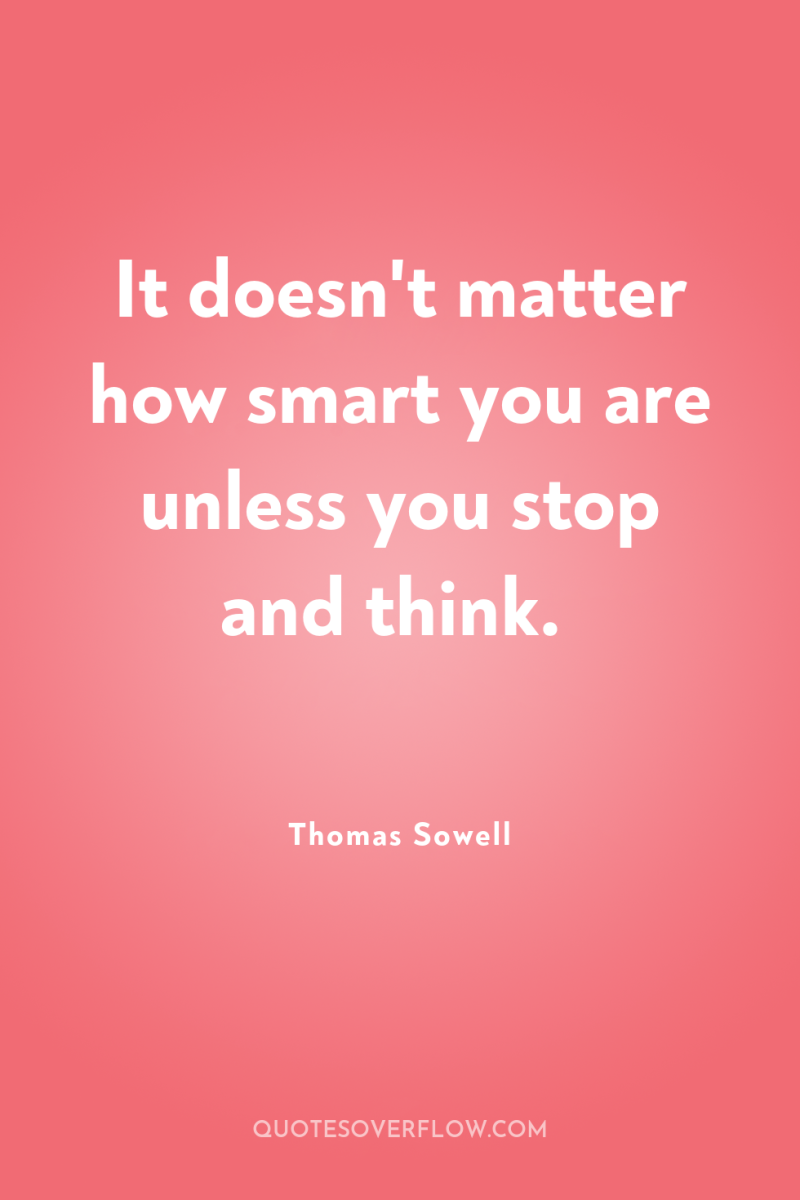
1
It doesn't matter how smart you are unless you stop and think.Thomas Sowell
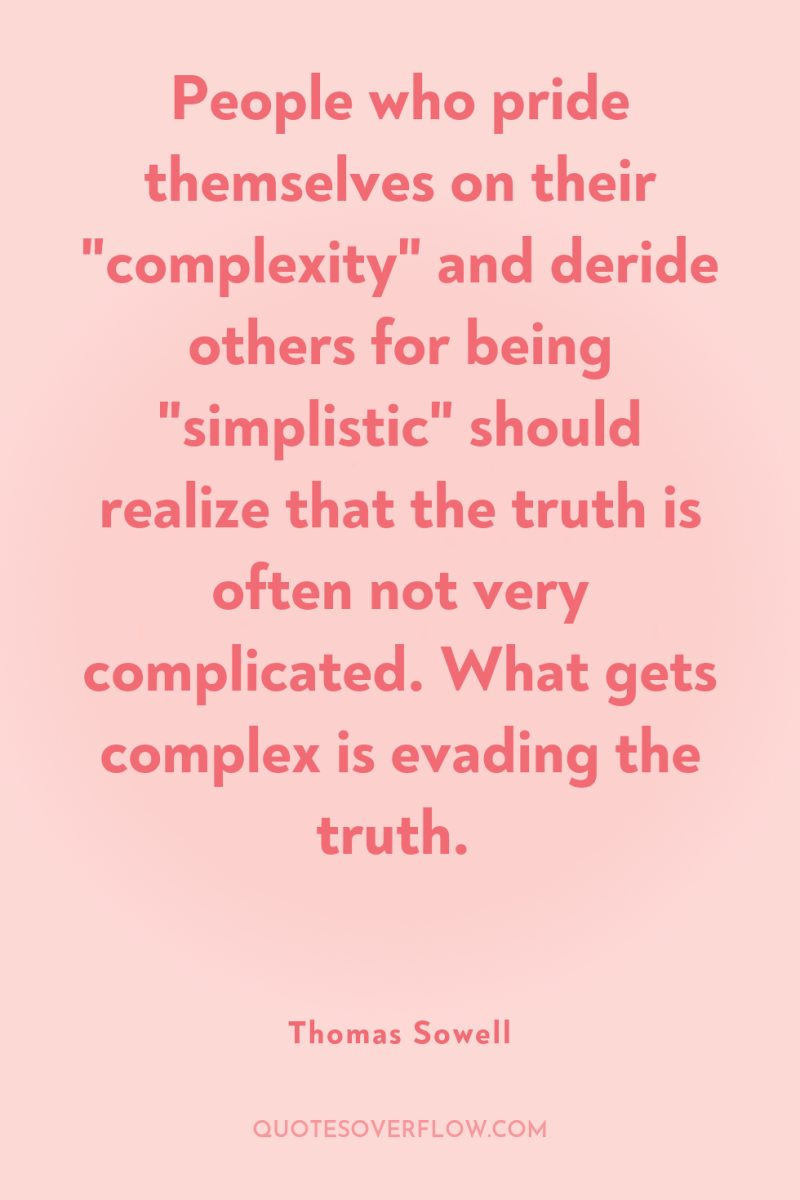
2
People who pride themselves on their "complexity" and deride others for being "simplistic" should realize that the truth is often not very complicated. What gets complex is evading the truth.Thomas Sowell
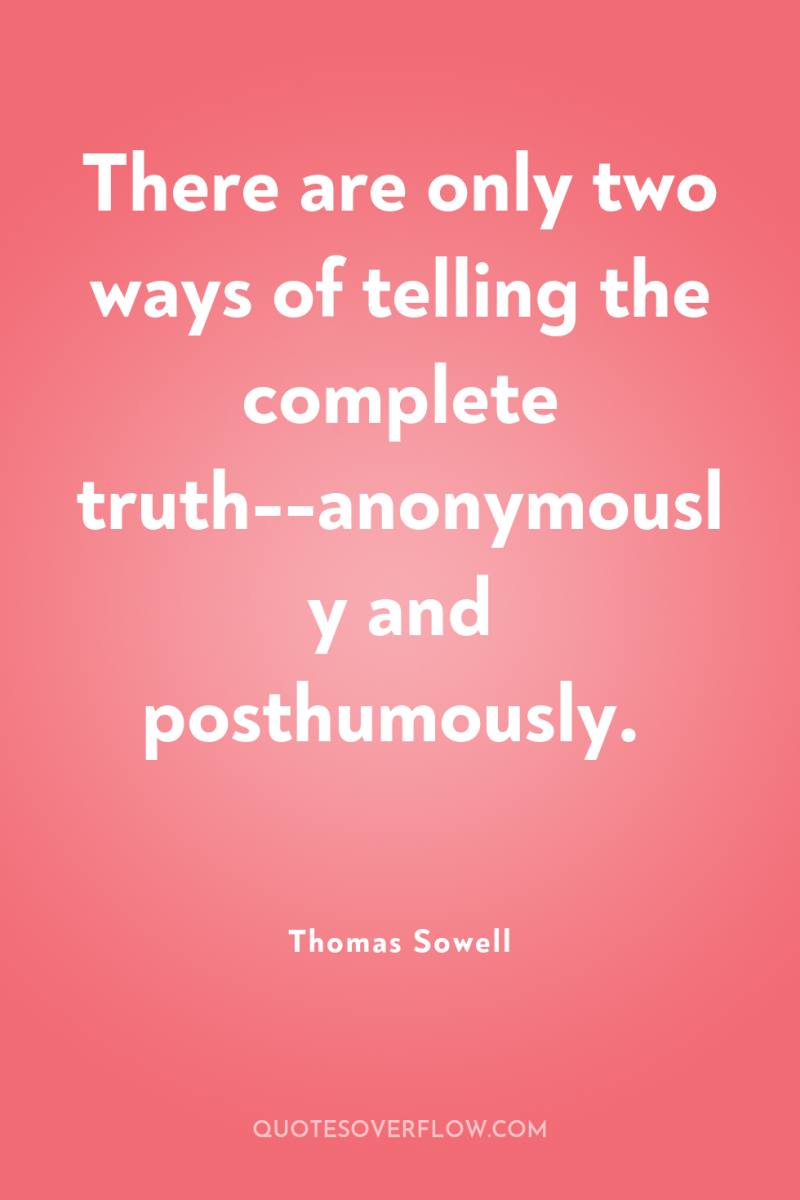
3
There are only two ways of telling the complete truth--anonymously and posthumously.Thomas Sowell
4
What is ominous is the ease with which some people go from saying that they don't like something to saying that the government should forbid it. When you go down that road, don't expect freedom to survive very long.Thomas Sowell
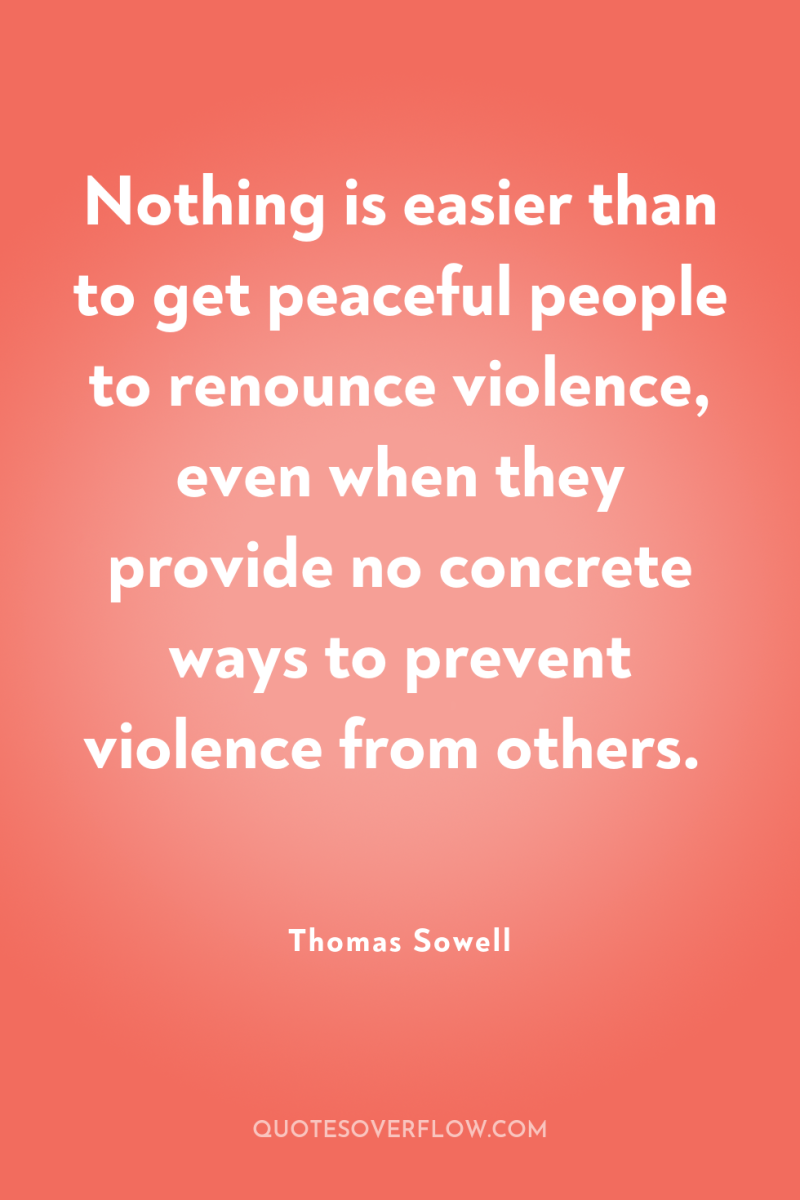
5
Nothing is easier than to get peaceful people to renounce violence, even when they provide no concrete ways to prevent violence from others.Thomas Sowell
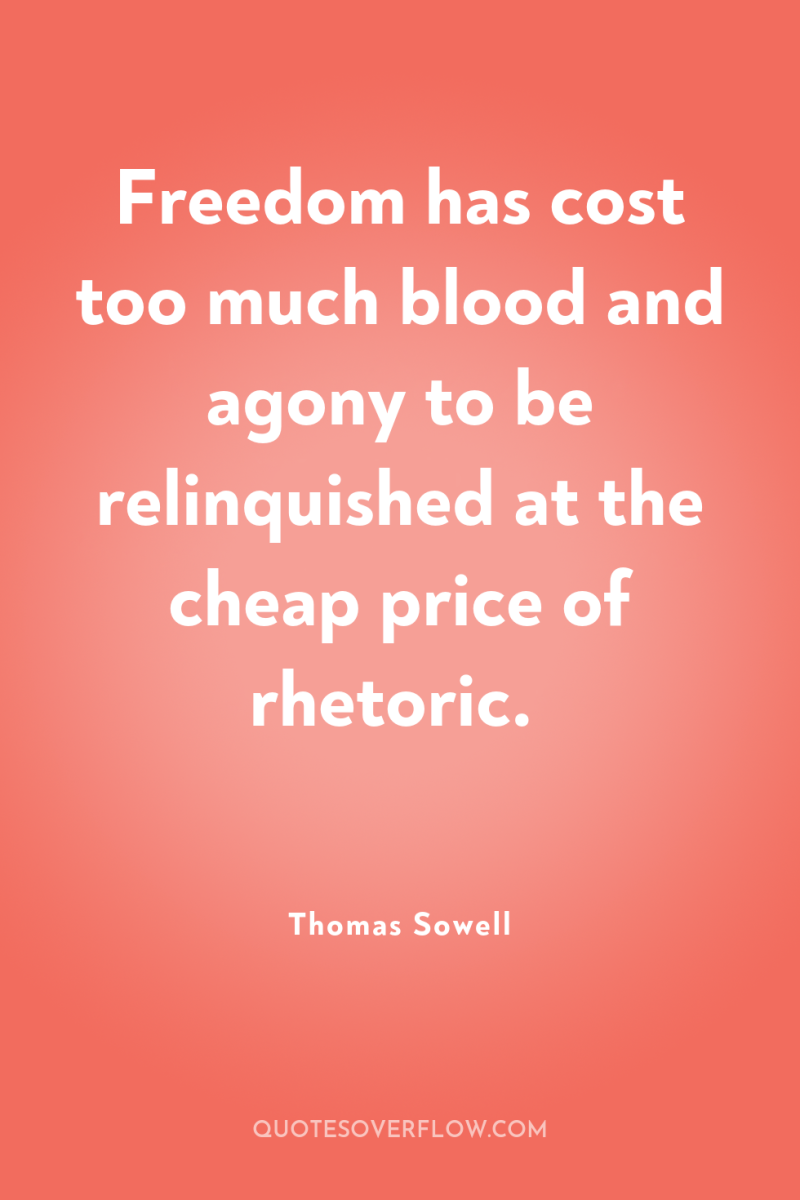
6
Freedom has cost too much blood and agony to be relinquished at the cheap price of rhetoric.Thomas Sowell
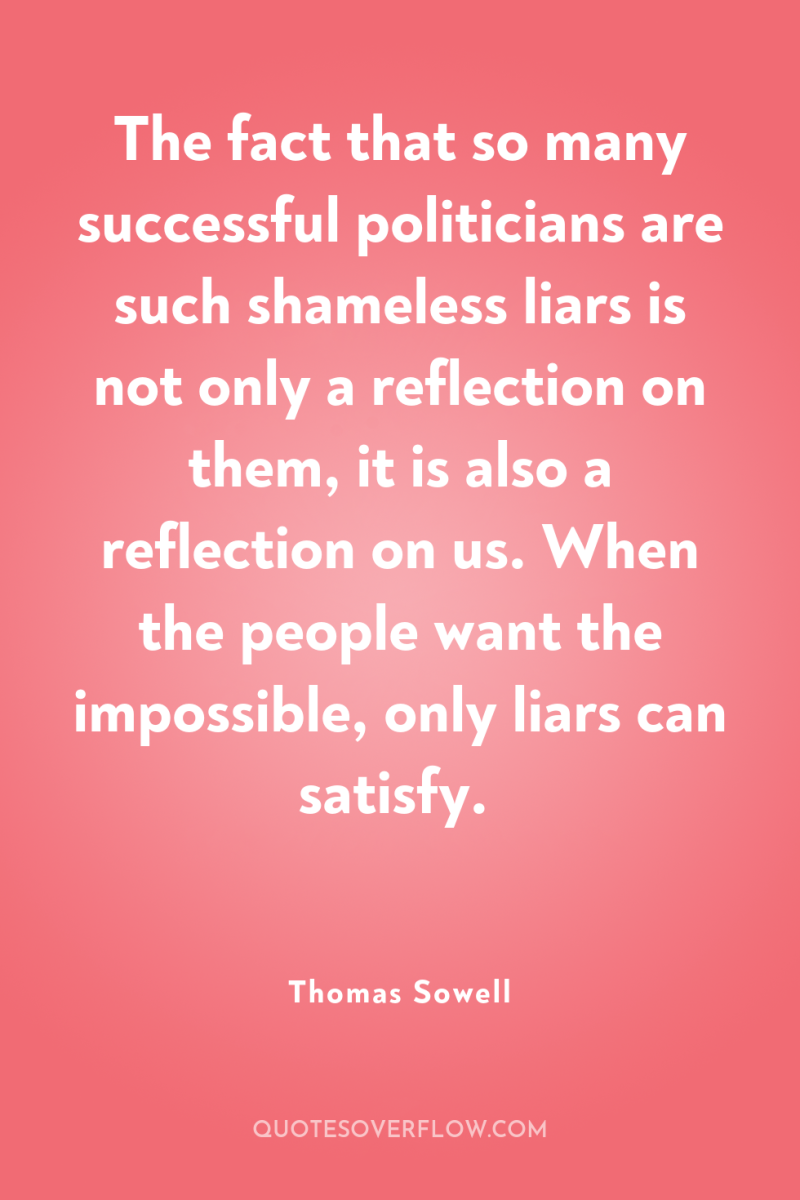
7
The fact that so many successful politicians are such shameless liars is not only a reflection on them, it is also a reflection on us. When the people want the impossible, only liars can satisfy.Thomas Sowell
8
What sense would it make to classify a man as handicapped because he is in a wheelchair today, if he is expected to be walking again in a month, and competing in track meets before the year is out? Yet Americans are generally given 'class' labels on the basis of their transient location in the income stream. If most Americans do not stay in the same broad income bracket for even a decade, their repeatedly changing 'class' makes class itself a nebulous concept. Yet the intelligentsia are habituated, if not addicted, to seeing the world in class terms.Thomas Sowell
9
The staunchest conservatives advocate a range of changes which differ in specifics, rather than in number or magnitude, from the changes advocated by those considered liberal…change, as such, is simply not a controversial issue. Yet a common practice among the anointed is to declare themselves emphatically, piously, and defiantly in favor of 'change.' Thus those who oppose their particular changes are depicted as being against change in general. It is as if opponents of the equation 2+2=7 were depicted as being against mathematics. Such a tactic might, however, be more politically effective than trying to defend the equation on its own merits. .Thomas Sowell
10
Clearly, only very unequal intellectual and moral standing could justify having equality imposed, whether the people want it or not, as Dworkin suggests, and only very unequal power would make it possible.Thomas Sowell
11
The power of the intelligentsia is demonstrated not only by their ability to create a general climate of opinion that strikes fear into those who oppose their agenda but also by their ability to create a climate of opinion which richly rewards those political leaders whose decisions are consonant with the vision of the intelligentsia.Thomas Sowell
12
What is history but the story of how politicians have squandered the blood and treasure of the human race?Thomas Sowell
13
The monumental tragedies of the 20th century -- a world-wide Great Depression, two devastating World Wars, the Holocaust, famines killing millions in the Soviet Union and tens of millions in China -- should leave us with a sobering sense of the threats to any society. But this generation's ignorance of history leaves them free to be frivolous -- until the next catastrophe strikes, and catches them completely by surprise.Thomas Sowell
14
Reality does not go away when it is ignored.Thomas Sowell
15
Intellect is not wisdom.Thomas Sowell
16
Despite a voluminous and often fervent literature on "income distribution, " the cold fact is that most income is not distributed: It is earned.Thomas Sowell
17
Despite widespread misconceptions in the United States today that the institution of slavery was based on race, for most of the thousands of years in which slavery existed around the world, it was based on whoever was vulnerable to enslavement and within striking distance. Thus Europeans enslaved other Europeans, just as Asians enslaved other Asians and Africans enslaved other Africans, while Polynesians enslaved other Polynesians and the indigenous peoples of the Western Hemisphere enslaved other indigenous peoples of the Western Hemisphere. The very word “slave" derived from the word for Slavs, who were enslaved by fellow Europeans for centuries before Africans began to be brought in chains to the Western Hemisphere. Africans were not singled out by a race for ownership by Europeans, they were resorted to after the rise of nation-states with armies and navies in other parts of the world which reduced the number of places that could be raided for slaves without great costs and risks. Slave-raiding continued in Africa, primarily by Africans enslaving other Africans and then, in West Africa, selling some of their slaves to whites to take to the Western Hemisphere. Meanwhile, the growing range of ships and the growing wealth of nations eventually made economically feasible the transportation of vast numbers of slaves from one continent to another, creating racial differences between the enslaved and their owners as a dominant pattern in the Western Hemisphere. Such a pattern was by no means limited to Europeans owning non- Europeans, however. There were many examples of the reverse, quite aside from vast regions of the earth where neither the slaves nor their owners were either black or white.Thomas Sowell
18
External explanations of black-white differences – discrimination or poverty, for example–seem to many to be more amenable to public policy than internal explanations such as culture. Those with this point of view tend to resist cultural explanations but there is yet another reason why some resist understanding the counterproductive effects of an anachronistic culture: Alternative explanations of economic and social lags provide a more satisfying ability to blame all such lags on the sins of others, such as racism or discrimination. Equally important, such external explanations require no painful internal changes in the black population but leave all changes to whites, who are seen as needing to be harangued, threatened, or otherwise forced to change. In short, prevailing explanations provide an alibi for those who lag–and an alibi is for many an enormously valuable asset that they are unlikely to give up easily. .Thomas Sowell
19
Price controls almost invariably produce black markets, where prices are not only higher than the legally permitted prices, but also higher than they would be in a free market, since the legal risks must also be compensated. While small-scale black markets may function in secrecy, large-scale black markets usually require bribes to officials to look the other way.Thomas Sowell
20
No one chooses which culture to be born into or can be blamed for how that culture evolved in past centuries.Thomas Sowell
21
There have always been ignorant people, but they haven't always had college degrees to make them unaware of their ignorance. Some people imagine that they are well informed because they have memorized a whole galaxy of trendy dogmas and fashionable attitudes.Thomas Sowell
22
Should a professor of accounting or chemistry be fired for using up class time to sound off about homelessness or the war in Iraq? Yes! There is no high moral principle that prevents it. What prevents it are tenure rules that have saddled so many colleges with so many self-indulgent prima donnas who seem to think that they are philosopher kings, when in fact they are often grossly ignorant or misinformed outside the narrow confines of their particular specialty.Thomas Sowell
23
A mere enumeration of government activity is evidence -- often the sole evidence offered -- of "inadequate" nongovernment institutions, whose "inability" to cope with problems "obviously" required state intervention. Government is depicted as acting not in response to its own political incentives and constraints but because it is compelled to do so by concern for the public interest: it "cannot keep its hands off" when so "much is at stake, " when emergency "compels" it to supersede other decision making processes. Such a tableau simple ignores the possibility that there are political incentives for the production and distribution of "emergencies" to justify expansions of power as well as to use episodic emergencies as a reason for creating enduring government institutions.Thomas Sowell
24
What all these lofty and vague phrases boil down to is that the court can impose things that the voters don't want and the Constitution does not require, but which are in vogue in circles to which the court responds.Thomas Sowell
25
It was Thomas Edison who brought us electricity, not the Sierra Club. It was the Wright brothers who got us off the ground, not the Federal Aviation Administration. It was Henry Ford who ended the isolation of millions of Americans by making the automobile affordable, not Ralph Nader. Those who have helped the poor the most have not been those who have gone around loudly expressing 'compassion' for the poor, but those who found ways to make industry more productive and distribution more efficient, so that the poor of today can afford things that the affluent of yesterday could only dream about. .Thomas Sowell
26
Among the many other questions raised by the nebulous concept of “greed” is why it is a term applied almost exclusively to those who want to earn more money or to keep what they have already earned–never to those wanting to take other people’s money in taxes or to those wishing to live on the largesse dispensed from such taxation. No amount of taxation is ever described as “greed” on the part of government or the clientele of government.Thomas Sowell
27
The welfare state is the oldest con game in the world. First you take people's money away quietly and then you give some of it back to them flamboyantly.Thomas Sowell
28
As history has also shown, especially in the twentieth century, one of the first things an ideologue will do after achieving absolute power is kill.Thomas Sowell
29
Lamenting the vagaries of fate may leave us with a galling sense of helpless frustration, which many escape by transforming the tragedy of the human condition into the specific sins of specific societies. This turns an insoluble problem of cosmic justice into an apparently manageable issue of social justice. Since the sins of human beings are virtually inexhaustible, there is seldom a lack of examples of wrongdoing to which intergroup differences can be attributed, rightly or wrongly. Where the quest for injustice is over-riding, among the things it over-rides are logic and evidence. .Thomas Sowell
30
It takes no more research than a trip to almost any public library or college to show the incredibly lopsided coverage of slavery in the United States or in the Western Hemisphere, as compared to the meager writings on even larger number of Africans enslaved in the Islamic countries of the Middle East and North Africa, not to mention the vast numbers of Europeans also enslaved in centuries past in the Islamic world and within Europe itself. At least a million Europeans were enslaved by North African pirates alone from 1500 to 1800, and some Europeans slaves were still being sold on the auction blocks in the Egypt, years after the Emancipation Proclamation freed blacks in the United States.Thomas Sowell
31
Unfortunately, the real minimum wage is always zero, regardless of the laws, and that is the wage that many workers receive in the wake of the creation or escalation of a government-mandated minimum wage, because they lose their jobs or fail to find jobs when they enter the labor force. Making it illegal to pay less than a given amount does not make a worker’s productivity worth that amount–and, if it is not, that worker is unlikely to be employed.Thomas Sowell
32
Racism does not have a good track record. It's been tried out for a long time and you'd think by now we'd want to put an end to it instead of putting it under new management.Thomas Sowell
33
It would be very heard, for example, a basketball owner, no matter how racist he was, to try to operate without Blacks. It would be suicidal.Thomas Sowell
34
Economics is a study of cause-and-effect relationships in an economy. It's purpose is to discern the consequences of various ways of allocating resources which have alternative uses. It has nothing to say about philosophy or values, anymore than it has to say about music or literature.Thomas Sowell
35
Everyone may be called "comrade, " but some comrades have the power of life and death over other comrades.Thomas Sowell
36
What then is the intellectual advantage of civilization over primitive savagery? It is not necessarily that each civilized man has more knowledge but that he requires far less.Thomas Sowell
37
The government is indeed an institution, but "the market" is nothing more than an option for each individual to chose among numerous existing institutions, or to fashion new arrangements suited to his own situation and taste.Thomas Sowell
38
When I was an undergraduate studying economics under Professor Arthur Smithies of Harvard, he asked me in class one day what policy I favored on a particular issue of the times. Since I had strong feelings on that issue, I proceeded to answer him with enthusiasm, explaining what beneficial consequences I expected from the policy I advocated. “And then what will happen?” he asked. The question caught me off guard. However, as I thought about it, it became clear that the situation I described would lead to other economic consequences, which I then began to consider and to spell out. “And what will happen after that?” Professor Smithies asked. As I analyzed how the further economic reactions to the policy would unfold, I began to realize that these reactions would lead to consequences much less desirable than those at the first stage, and I began to waver somewhat. “And then what will happen?” Smithies persisted. By now I was beginning to see that the economic reverberations of the policy I advocated were likely to be pretty disastrous– and, in fact, much worse than the initial situation that it was designed to improve. Simple as this little exercise might seem, it went further than most economic discussions about policies on a wide range of issues. Most thinking stops at stage one.Thomas Sowell
39
Misconceptions of business are almost inevitable in a society where most people have neither studied nor run businesses. In a society where most people are employees and consumers, it is easy to think of businesses as “them” — as impersonal organizations, whose internal operations are largely unknown and whose sums of money may sometimes be so huge as to be unfathomable.Thomas Sowell
40
Lthough the basic principles of economics are not very complicated, the very ease with which they can be learned also makes them easy to dismissed as "simplistic" by those who do not want to accept analyses which contradict their cherished beliefs. Evasions of the obvious are often far more complicated than the facts. Nor is it automatically true that complex effects must have complex causes. The ramifications of something very simple can become enormously complex. .Thomas Sowell
41
I think we're raising whole generations who regard facts as more or less optional. We have kids in elementary school who are being urged to take stands on political issues, to write letters to congressmen and presidents about nuclear energy. They're not a decade old, and they're being thrown these kinds of questions that can absorb the lifetime of a very brilliant and learned man. And they're being taught that it's important to have views, and they're not being taught that it's important to know what you're talking about. It's important to hear the opposite viewpoint, and more important to learn how to distinguish why viewpoint A and viewpoint B are different, and which one has the most evidence or logic behind it. They disregard that. They hear something, they hear some rhetoric, and they run with it. .Thomas Sowell
42
It is hard to imagine a more stupid or more dangerous way of making decisions than by putting those decisions in the hands of people who pay no price for being wrong.Thomas Sowell
43
Liberals seem to assume that, if you don’t believe in their particular political solutions, then you don’t really care about the people that they claim to want to help.Thomas Sowell
44
White liberals, instead of comparing what has happened to the black family since the liberal welfare state policies of the 1960s were put into practice, compare black families to white families and conclude that the higher rates of broken homes and unwed motherhood among blacks are due to “a legacy of slavery.” But why the large-scale disintegration of the black family should have begun a hundred years after slavery is left unexplained. Whatever the situation of the black family relative to the white family, in the past or the present, it is clear that broken homes were far more common among blacks at the end of the twentieth century than they were in the middle of that century or at the beginning of that century –even though blacks at the beginning of the twentieth century were just one generation out of slavery. The widespread and casual abandonment of their children, and of the women who bore them, by black fathers in the ghettos of the late twentieth century was in fact a painfully ironic contrast with what had happened in the immediate aftermath of slavery a hundred years earlier, when observers in the South reported desperate efforts of freed blacks to find family members who had been separated from them during the era of slavery.Thomas Sowell
45
Nothing is easier than to find some individuals–in any group–who share a given writer’s opinion, and to quote such individuals as if their views were typical.Thomas Sowell
46
Information or allegations reflecting negatively on individuals or groups seen less sympathetically by the intelligentsia pass rapidly into the public domain with little scrutiny and much publicity. Two of the biggest proven hoaxes of our time have involved allegations of white men gang-raping a black woman-- first the Tawana Brawley hoax of 1987 and later the false rape charges against three Duke University students in 2006. In both cases, editorial indignation rang out across the land, without a speck of evidence to substantiate either of these charges. Moreover, the denunciations were not limited to the particular men accused, but were often extended to society at large, of whom these men were deemed to be symptoms or 'the tip of the iceberg.' In both cases, the charges fit a pre-existing vision, and that apparently made mundane facts unneces.Thomas Sowell
47
If people in the media cannot decide whether they are in the business of reporting news or manufacturing propaganda, it is all the more important that the public understand that difference, and choose their news sources accordingly.Thomas Sowell
48
Systemic processes tend to reward people for making decisions that turn out to be right–creating great resentment among the anointed, who feel themselves entitled to rewards for being articulate, politically active, and morally fervent.Thomas Sowell
49
When people get used to preferential treatment, equal treatment seems like discrimination.Thomas Sowell
50
If politicians stopped meddling with things they don't understand, there would be a more drastic reduction in the size of government than anyone in either party advocates.Thomas Sowell
51
Many have blamed the gasoline shortages and long lines at filling stations in 1973 on the Arab Oil embargo of that year. However, the shortages and long lines began months before the Arab oil embargo, right after price controls were imposed.Thomas Sowell
52
As for gun control advocates, I have no hope whatever that any facts whatever will make the slightest dent in their thinking - or lack of thinking.Thomas Sowell
53
One of the common failings among honorable people is a failure to appreciate how thoroughly dishonorable some other people can be, and how dangerous it is to trust them.Thomas Sowell
54
Socialism in general has a record of failure so blatant that only an intellectual could ignore or evade it.Thomas Sowell
55
Many people, including some conservatives, have been very impressed with how brainy the president and his advisers are. But that is not quite as reassuring as it might seem.Thomas Sowell
56
Brainy folks were also present in Lyndon Johnson's administration, especially in the Pentagon, where Secretary of Defense Robert McNamara's brilliant 'whiz kids' tried to micro-manage the Vietnam war, with disastrous results.Thomas Sowell
57
The black family survived centuries of slavery and generations of Jim Crow, but it has disintegrated in the wake of the liberals' expansion of the welfare state.Thomas Sowell
58
The biggest and most deadly 'tax' rate on the poor comes from a loss of various welfare state benefits - food stamps, housing subsidies and the like - if their income goes up.Thomas Sowell
59
The next time some academics tell you how important diversity is, ask how many Republicans there are in their sociology department.Thomas Sowell
60
One of the most pervasive political visions of our time is the vision of liberals as compassionate and conservatives as less caring.Thomas Sowell
61
The big divide in this country is not between Democrats and Republicans, or women and men, but between talkers and doers.Thomas Sowell
62
The most basic question is not what is best, but who shall decide what is best.Thomas Sowell
63
Wishful thinking is not idealism. It is self-indulgence at best and self-exaltation at worst. In either case, it is usually at the expense of others. In other words, it is the opposite of idealism.Thomas Sowell
64
Much of the social history of the Western world, over the past three decades, has been a history of replacing what worked with what sounded good.Thomas Sowell
65
It is amazing that people who think we cannot afford to pay for doctors, hospitals, and medication somehow think that we can afford to pay for doctors, hospitals, medication and a government bureaucracy to administer it.Thomas Sowell
66
It takes considerable knowledge just to realize the extent of your own ignorance.Thomas Sowell
67
Prices are important not because money is considered paramount but because prices are a fast and effective conveyor of information through a vast society in which fragmented knowledge must be coordinated.Thomas Sowell
68
Just what is it that academics have to fear if they stand up for common decency, instead of letting campus barbarians run amok?Thomas Sowell
69
People who enjoy meetings should not be in charge of anything.Thomas Sowell
70
I suspect that even most conservatives would prefer to live in the kind of world conjured up in the liberals' imagination rather than in the kind of world we are in fact stuck with.Thomas Sowell
71
The first lesson of economics is scarcity: there is never enough of anything to fully satisfy all those who want it. The first lesson of politics is to disregard the first lesson of economics.Thomas Sowell
72
If you have always believed that everyone should play by the same rules and be judged by the same standards, that would have gotten you labeled a radical 60 years ago, a liberal 30 years ago and a racist today.Thomas Sowell
73
All the political angst and moral melodrama about getting 'the rich' to pay 'their fair share' is part of a big charade. This is not about economics, it is about politics.Thomas Sowell
74
The march of science and technology does not imply growing intellectual complexity in the lives of most people. It often means the opposite.Thomas Sowell
75
The Massachusetts Institute of Technology accepts blacks in the top ten percent of students, but at MIT this puts them in the bottom ten percent of the class.Thomas Sowell
76
Life in general has never been even close to fair, so the pretense that the government can make it fair is a valuable and inexhaustible asset to politicians who want to expand government.Thomas Sowell
77
Those who cry out that the government should 'do something' never even ask for data on what has actually happened when the government did something, compared to what actually happened when the government did nothing.Thomas Sowell
78
The real goal should be reduced government spending, rather than balanced budgets achieved by ever rising tax rates to cover ever rising spending.Thomas Sowell
79
The more people who are dependent on government handouts, the more votes the left can depend on for an ever-expanding welfare state.Thomas Sowell
80
Even if the government spends itself into bankruptcy and the economy still does not recover, Keynesians can always say that it would have worked if only the government had spent more.Thomas Sowell
81
In liberal logic, if life is unfair then the answer is to turn more tax money over to politicians, to spend in ways that will increase their chances of getting reelected.Thomas Sowell
82
Too much of what is called 'education' is little more than an expensive isolation from reality.Thomas Sowell
83
Education is not merely neglected in many of our schools today, but is replaced to a great extent by ideological indoctrination.Thomas Sowell
84
Those parts of history that would undermine the vision of the Left - which prevails in our education system from elementary school to postgraduate study - are not likely to get much attention.Thomas Sowell
85
Creating whole departments of ethnic, gender, and other 'studies' was part of the price of academic peace. All too often, these 'studies' are about propaganda rather than serious education.Thomas Sowell
86
Mystical references to society and its programs to help may warm the hearts of the gullible but what it really means is putting more power in the hands of bureaucrats.Thomas Sowell
87
Without a moral framework, there is nothing left but immediate self-indulgence by some and the path of least resistance by others. Neither can sustain a free society.Thomas Sowell
88
It is hard to read a newspaper or watch a television newscast without encountering someone who has come up with a new 'solution' to society's 'problems.'Thomas Sowell